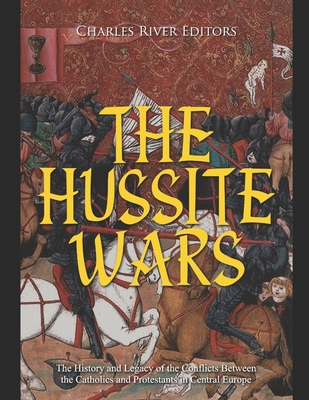The Hussite Wars: The History and Legacy of the Conflicts Between the Catholics and Protestants in Central Europe

The Hussite Wars: The History and Legacy of the Conflicts Between the Catholics and Protestants in Central Europe
*Includes pictures
*Includes a bibliography for further reading
"Therefore, faithful Christian, seek the truth, listen to the truth, learn the truth, love the truth, tell the truth, learn the truth, defend the truth even to death." - Jan Hus
The 15th century was a pivotal era for Europe, during which it transitioned from a social and religious union under Christendom into a disparate collection of nation-states, and it was during this period that the Middle Ages came to an end and the Modern Period began.
Less than a century earlier, in the mid-14th century, the Vatican called upon England and sought financial aid in the hopes of boosting papal defenses against French forces. It was then that John Wycliffe boldly stepped forth and appealed to the John of Gaunt, urging the Duke of Lancaster and Parliament to repudiate Rome's demands and citing what he believed to be the Church's abundance in wealth. According to Wycliffe, Christ's disciples, particularly clergymen, must aspire to live modestly and shun all material pleasures. Such was the word of the Lord.
Wycliffe's relentless criticism of the Church only continued to escalate, and eventually he was summoned to London and charged with the unforgivable crime of heresy. To the dismay of his detractors, the hearing was anything but black and white, and heated verbal exchanges soon spiraled into physical altercations. This resulted in a temporary deadlock that was broken only three months later when Pope Gregory XI published five papal bulls that unequivocally banned all of Wycliffe's teachings and found the heretic, dubbed the "master of errors," guilty of 18 counts of heresy. The end, it appeared, was nigh, but Wycliffe remained unfazed, declaring, "I profess and claim to be by the grace of God a sound...Christian and while there is breath in my body, I will speak forth and defend the law of it." Wycliffe told the archbishop at Lambeth Palace, "I am ready to defend my convictions even unto death...I have followed the Sacred Scriptures and the holy doctors."
Though branded a heretic, the renegade did not die in Christ's name, but Hus would not be so fortunate. Moreover, while Wycliffe's critics rejoiced at the news of his demise, they soon discovered that his influence was far more difficult to extinguish than they initially anticipated. In 1427, a whole 43 years after Wycliffe's passing, his corpse was exhumed by local authorities and cremated, and the ashes were dumped into the River S
PRP: 86.34 Lei
Acesta este Prețul Recomandat de Producător. Prețul de vânzare al produsului este afișat mai jos.
69.07Lei
69.07Lei
86.34 LeiLivrare in 2-4 saptamani
Descrierea produsului
*Includes pictures
*Includes a bibliography for further reading
"Therefore, faithful Christian, seek the truth, listen to the truth, learn the truth, love the truth, tell the truth, learn the truth, defend the truth even to death." - Jan Hus
The 15th century was a pivotal era for Europe, during which it transitioned from a social and religious union under Christendom into a disparate collection of nation-states, and it was during this period that the Middle Ages came to an end and the Modern Period began.
Less than a century earlier, in the mid-14th century, the Vatican called upon England and sought financial aid in the hopes of boosting papal defenses against French forces. It was then that John Wycliffe boldly stepped forth and appealed to the John of Gaunt, urging the Duke of Lancaster and Parliament to repudiate Rome's demands and citing what he believed to be the Church's abundance in wealth. According to Wycliffe, Christ's disciples, particularly clergymen, must aspire to live modestly and shun all material pleasures. Such was the word of the Lord.
Wycliffe's relentless criticism of the Church only continued to escalate, and eventually he was summoned to London and charged with the unforgivable crime of heresy. To the dismay of his detractors, the hearing was anything but black and white, and heated verbal exchanges soon spiraled into physical altercations. This resulted in a temporary deadlock that was broken only three months later when Pope Gregory XI published five papal bulls that unequivocally banned all of Wycliffe's teachings and found the heretic, dubbed the "master of errors," guilty of 18 counts of heresy. The end, it appeared, was nigh, but Wycliffe remained unfazed, declaring, "I profess and claim to be by the grace of God a sound...Christian and while there is breath in my body, I will speak forth and defend the law of it." Wycliffe told the archbishop at Lambeth Palace, "I am ready to defend my convictions even unto death...I have followed the Sacred Scriptures and the holy doctors."
Though branded a heretic, the renegade did not die in Christ's name, but Hus would not be so fortunate. Moreover, while Wycliffe's critics rejoiced at the news of his demise, they soon discovered that his influence was far more difficult to extinguish than they initially anticipated. In 1427, a whole 43 years after Wycliffe's passing, his corpse was exhumed by local authorities and cremated, and the ashes were dumped into the River S
Detaliile produsului










